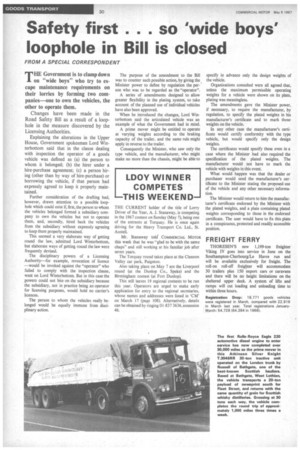Safety first . . . so 'wide boys' loophole in Bill is closed
Page 32

If you've noticed an error in this article please click here to report it so we can fix it.
FROM A SPECIAL CORRESPONDENT
THE Government is to clamp down on "wide boys" who try to escape maintenance requirements on their lorries by forming two companies—one to own the vehicles, the other to operate them.
Changes have been made in the Road Safety Bill as a result of a loophole in the measure discovered by the Licensing Authorities.
Explaining the alterations in the Upper House, Government spokesman Lord Winterbottom said that M the clause dealing with inspection the operator of a goods vehicle was defined as (a) the person to whom it belonged; (b) the hirer under a hire-purchase agreement; (c) a person hiring (other than by way of hire-purchase) or borrowing the vehicle, if that person had expressly agreed to keep it properly maintained.
Further consideration of the drafting had, however, drawn attention to a possible loophole which could exist if, first, the person to whom the vehicles belonged formed a subsidiary company to own the vehicles but not to operate them, and, secondly, hired back the vehicles From the subsidiary without expressly agreeing to keep them properly maintained.
This seemed a very elaborate way of getting round the law, admitted Lord Winterbottom, but elaborate ways of getting round the law were frequently devised.
The disciplinary powers of a Licensing Authority—for example, revocation of licence —would be invoked against the "operator" who failed to comply with the inspection clause, went on Lord Winterbottom. But in this case the powers could not bite on the subsidiary because the subsidiary, not in practice being an operator for licensing purposes, would hold no carrier's licences.
The person to whom the vehicles really belonged would be equally immune from disciplinary action. The purpose of the amendment to the Bill was to counter such possible action, by giving the Minister power to define by regulation the person who was to be regarded as the "operator".
A series of amendments designed to allow greater flexibility in the plating system, to take account of the planned use of individual vehicles have also been approved.
When he introduced the changes, Lord Winterbottom said the articulated vehicle was an example of what the Government had in mind.
A prime mover might be entitled to operate at varying weights according to the braking capacity of the trailer, and the same rule might apply in reverse to the trailer.
Consequently the Minister, who saw only the type vehicle, and the manufacturer, who might make no more than the chassis, might be able to specify in advance only the design weights of the vehicle.
Organizations consulted were all agreed that, unless the maximum permissible operating weights for a vehicle were shown on its plate, plating was meaningless.
The amendments gave the Minister power, if necessary, to require the manufacturer, by regulation, to specify the plated weights in his manufacturer's certificate and to mark those weights on the vehicle.
In any other case the manufacturer's certificate would certify conformity with the type vehicle, but would specify only the design weights.
The certificates would specify these even in a case where the Minister had also required the specification of the plated weights. The manufacturer would not have to mark the vehicle with weights in this event.
What would happen was that the dealer or purchaser would send the manufacturer's certificate to the Minister stating the proposed use of the vehicle and any other necessary information.
The Minister would return to him the manufacturer's certificate endorsed by the Minister with the plated weights, and a plate containing plated weights corresponding to those in the endorsed certificate. The user would have to fix this plate in a conspicuous, protected and readily accessible position.
FREIGHT FERRY
THORESEN'S new 1,199-ton freighter Viking IV goes into service in June on the Southampton-Cherbourg/Le Havre run and will be available exclusively for freight. The roll-on roll-off freighter will accommodate 30 trailers plus 150 export cars or caravans and there will be no height limitations on the sheltered upper deck. A system of lifts and ramps will cut loading and unloading time to within three hours.
Registration Drop: 18.771 goods vehicles were registered in March, compared with 22,916 in March last year. Total registrations JanuaryMarch: 54,728 164,384 in 1966).




















































































































